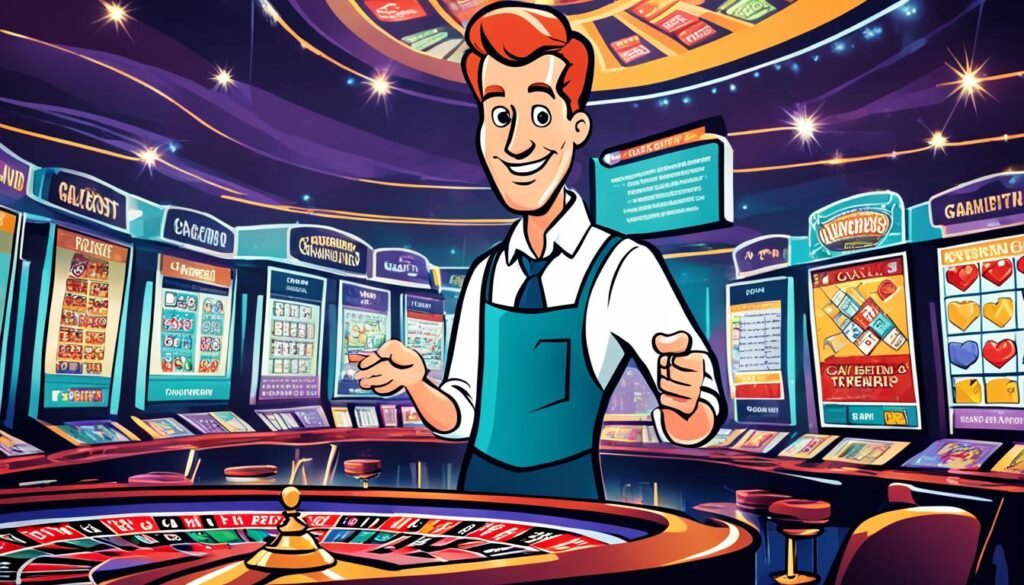The Role of Staff in Promoting Responsible Gambling: Training and Best Practices
Picture yourself in a vibrant casino with bright lights and the exciting sounds of people winning. This place is fun for many, but it can turn into a dangerous spot for some. For those struggling with a gambling addiction, the casino can be a tough place to be. That’s why the work of casino employees is so important.
The key to stopping gambling addictions is having staff who are smart and aware. A study from the Massachusetts Gaming Commission shows us how much staff help prevent gambling problems. Proper training helps them spot trouble early and take action to protect people and the community.
Learning about responsible gambling isn’t just something to do once and forget. The National Council on Problem Gambling holds training sessions that cost between $119 to $139. These sessions, set for September 19, 2024, and November 14, 2024, aim to teach staff the latest skills needed to handle difficult situations.
Experts, like those at the Responsible Gambling Council, show that well-trained staff make a big difference. When employees know what to do and feel confident, they do a better job. They help guests with gambling problems in a supportive and caring way. It’s not just about stopping problems but creating a safe and caring environment.
Key Takeaways
- Employee engagement in responsible gaming is crucial for gambling addiction prevention.
- Proper training equips staff with the skills to identify and address problem gambling behaviors.
- Regular training sessions by reputable organizations, such as the National Council on Problem Gambling, ensure staff stay updated with the latest practices.
- The Massachusetts Gaming Commission’s Responsible Gaming Framework highlights the need for sustained and proactive staff involvement.
- Enhanced staff knowledge and confidence lead to improved interactions with at-risk patrons, fostering a safer gambling environment.
Introduction to Responsible Gambling
Responsible gambling means using rules and practices to make gambling safer. This is needed to lower harm and take care of people’s health. It requires teams from the government, the gambling industry, and others. They work together to make sure gambling happens fairly and doesn’t hurt society.
Gambling is very common in the U.S. In 2013, almost 77% of adults gambled over the year. And 85% have tried gambling at least once. Still, only a small part of the population, between 0.2% to 1%, actually has a gambling problem.
About 1% of U.S. adults have a gambling problem. This number jumps to 2.4% using newer criteria. This is lower than addiction rates to substances like nicotine and alcohol. Yet, it shows the urgent need for careful gambling rules and public health actions.
In Canada, meaningful steps have been taken. In 2014-2015, they put 0.41% to 3.50% of gambling profits towards helping people with gambling issues. Plus, they gave money to operator programs in different provinces. These programs help many, including self-exclusion options for people who want to stop.
Canada also educates young people about safe gambling. They send out info and do shows in schools. In addition, they put resources about responsible gambling in places where gambling happens. This includes casinos and places to buy lottery tickets.
| Measure | Percentage/Funding |
|---|---|
| Adults Gambled in Past Year (U.S.) | 76.9% |
| Adults with Gambling Disorder (U.S., DSM-IV) | 1% |
| Total Gross Gaming Revenues Allocated to Problem Gambling (British Columbia, 2014-2015) | 0.41% |
| Total Gross Gaming Revenues Allocated to Problem Gambling (Ontario, 2014-2015) | 3.50% |
| Funding for Responsible Gambling Programs (Newfoundland, 2014-2015) | $214K |
| Funding for Responsible Gambling Programs (Ontario, 2014-2015) | $16.3M |
Responsible gambling is key for everyone’s safety. It makes gambling fun but not risky. It creates a space where everyone can enjoy the games safely.
The Importance of Training in Responsible Gambling
Training is key in making sure gambling is done responsibly. Its main goal is to teach workers how to help players showing signs of risky play.
Objectives of Responsible Gambling Training
The main aims of this training are:
- Enhancing awareness of harms caused by gambling. This makes sure staff can spot and deal with early signs of problem gambling.
- Boosting skills and attitudes in helping those at risk. This creates a helpful environment around gambling activities.
- Encouraging ethical behavior and care for the community. Both regulators and the industry expect this.
A study in 2004 by Ladouceur et al. in Canada looked at 1211 video lottery terminal sellers. They found these sellers understood more about the dangers of heavy gambling after training.
Types of Training Programs
There are many different training programs in responsible gambling. They come from gambling companies, government groups, or other organizations. Here are some common types:
- Online modules are easy to access and let employees learn at their own speed about how to gamble responsibly.
- In-person workshops are also used. These allow for hands-on learning and group discussions on spotting and treating problem gambling.
- Ongoing training sessions are important too. They keep workers up to date on dealing with problem gambling as well as laws and rules.
Studies show that these programs really work. In Canada, the Dufour et al., 2008 study found that 826 workers at venues with VLTs knew more about problem gambling after training. Wong & Poon, 2011 studied 63 casino workers in Asia. They too showed a better understanding of gambling issues and were more confident in helping after training.
To sum up, educating people on the dangers of gambling is crucial. It helps create a safe environment where workers can help players who might be at risk.
Best Practices for Responsible Gambling Training
Training to reduce gambling harm is key for a safe gaming space. MGM Resorts International is a great example of this effort. They work closely with the Nevada Gaming Control Board and Ohio Casino Control Commission. Let’s look at the main ideas behind these practices.
Core Principles
Responsible gambling training is based on several main ideas:
- Ethical Advertising: Ads must be honest and should not target at-risk groups.
- Educating the Public on Gambling Odds: Sharing clear information about odds helps players choose wisely.
- Advocating for Help Services: It’s critical to tell people about support services like hotlines.
- Enforcing Underage Play Restrictions: They’ve strict rules to stop young people from gambling.
- Research-Based Policy Development: They use new info to make rules that reduce harm each year.
Everyone at the company gets trained, from the newest to the most experienced. They use the Reno Model to handle new problems quickly. MGM Resorts International also does frequent training updates. They cover alcohol service rules and responsible gaming. This helps staff deal well with risky gambling behavior.
Now, how does gambling disorder compare to other substance use issues in the U.S.? Let’s look at some numbers:
| Disorder | Prevalence (%) |
|---|---|
| Gambling Disorder (DSM-5) | 2.4 |
| Nicotine | 13 |
| Alcohol | 8.5 |
| Cannabis | 1.5 |
| Opioid | 0.4 |
| Cocaine | 0.3 |
| Stimulants (non-cocaine) | 0.2 |
In places like Nevada, training helps staff spot and help those with gambling issues. They also have tools like GAMSTOP in the UK to limit gambling. Plus, there are programs in the U.S. where people can choose to not gamble. These tools are vital in helping people control their gambling habits.
Structured training is a big part of making the gaming industry safer. By following responsible gaming practices, they protect players and the industry’s reputation. This approach to responsible gambling is a win for everyone.
Casino Staff Responsibilities in Promoting Responsible Gambling
Casino staff have key roles in *promoting responsible gaming*. They must focus on keeping the gambling environment safe. Their main goal is to make sure customers have all the help and information they need to gamble the right way.
Interaction with Customers
Talking with customers in the right way is vital for a safe gambling place. Staff learn how to spot signs of problem gambling. They talk in a way that can stop bad habits. They use a *customer-centric approach* to teach people how to gamble responsibly and to quietly offer help.
The Massachusetts Gaming Commission’s framework is set on safeguarding the public and promoting good gambling habits. So, it’s crucial that staff provide correct info and help to people dealing with problem gambling. They need to keep a record of their talks. This is so they can check how well their efforts are working.
Implementing Self-Exclusion Measures
Self-exclusion steps are very important for safe gambling. Those who wish to can stop themselves from using casino services. Staff are trained to help people understand how to do this and to show them where to get more info.
The Entain Foundation supports programs that help prevent problem gambling, including self-exclusion. They gave $5 million in partnership with Harvard Medical School. Tools like RG2 and Responsible Gaming Identification at Slots help to stop banned players from using the casino. This ensures everyone stays safe.
The following table outlines key aspects of self-exclusion protocols:
| Aspect | Details |
|---|---|
| Implementation | Voluntary, informed consent required |
| Duration | Varies from temporary to permanent exclusions |
| Support | Access to resources and counseling |
| Tracking | Utilization of technology to monitor compliance |
Casino staff greatly help by focusing on the customer and using self-exclusion steps. Together, this makes sure the gambling place is safe for everyone.
Identifying Problem Gambling Behaviors
It’s key to spot problem gambling for responsible gaming. Casino workers need training to see if someone plays too much. This includes how often they play, how long, and how much they spend. Signs of stress, frustration, or pulling away from others also tell us someone might be in trouble with gambling.
A big study looked at 16 more studies and found 20 ways to cut the risks of gambling too much. Rules about not letting people smoke or drink too much while they play can help change how people act. These rules make the risky parts of playing less, making them a smart move.
Watching closely is key to these rules working. Staff at places where folks gamble need to keep an eye out for signs that someone’s overdoing it. This takes good training and a quick response. Then, they can help those who need to back off from the games.
A study by Beckett and a team showed how training can make casino workers better at their job. They know more about helping players play it safe. But, they don’t always learn what to do when things get really hard. This shows we need to try hard at local levels to keep health and social problems from gambling in check.
Trying to help folks cut back on gambling can work, but we need more studies. The right policies can be different for regular players and those who gamble too much. It’s important to keep looking at what works best for each group.
Keeping an eye on how well we’re doing and making changes is important. Many governments are now seeing gambling problems as a community health risk. But, just making rules may not be enough. Local people still need to have a say in what we do about gambling near them.
| Focus Group | Participants | Roles |
|---|---|---|
| 1 | 12 | Problem Gambler in Treatment |
| 2 | 8 | Gaming Venue Staff |
| 3 | 10 | Consumer Advocates |
| 4 | 7 | Gambling Help Service Counsellors |
The Role of Staff in Promoting Responsible Gambling: Training and Best Practices
Being responsible when gambling is key for the casino world. Staff training is essential for this. They learn from a detailed responsible gaming action plan that teaches the latest methods. This mix of theory and practice helps them deal with issues casino-goers might face.
The National Council on Problem Gambling (NCPG) holds important meetings. These cost $119/session for members and $139/session for non-members. They are key for staff to learn more about addressing problem gambling. It’s a chance for experts and those involved to talk. This keeps the commitment to responsible gaming strong.
The American Gaming Association (AGA) was set up in 1995. It’s all about promoting safe gaming and reducing harm. While companies started educating about this in the mid-1990s, it wasn’t very consistent. The AGA set some standards through its Task Force and the National Center for Responsible Gaming (NCRG). They’ve pushed for more research, set some practices, and helped with education. Their Responsible Gaming Resource Guide in August 1996 has been a key reference since.
Let’s look at what’s being done industry-wide to promote safe gaming:
| Initiative | Details |
|---|---|
| Quarterly Symposiums | Comprehensive training sessions held by the NCPG to foster understanding and best practices. |
| AGA Task Force | Develops and implements industry-wide responsible gaming policies. |
| NCRG Grants | Providing financial support for scientific research into disordered gambling. |
| Resource Guide | Compilation of best practices, ideas, and programs for responsible gaming. |
Casino groups, researchers, and policy makers are working together. They want to make gaming safer for everyone. Ongoing training and sharing what works is essential. This way, the gaming environment becomes more careful and informed. It’s good for those who play and those who run casinos.
Effective Customer Interaction Guidelines
Good interactions with customers help promote safe gambling. Staff must know how to handle tough situations wisely and help players as needed. Their job is more than just keeping an eye out; they should actively help and tackle gambling problems head-on.
Communication Techniques
Great customer service in gambling starts with strong communication skills. The Gambling Commission found that gambling can harm families and communities. It’s vital that staff is able to spot and deal with these issues early on. They should be trained to look for certain signs:
- Time spent gambling
- Visit frequency
- Changes in spending behavior
- Use of gambling management tools
- Customer-led contact
- Significant wins or losses
It’s crucial to set the right limits for how much customers can spend. By setting realistic limits on how much customers can deposit or lose, it helps stop them from overspending. This kind of early help is vital for preventing big problems.
Also, keeping a record of customers’ interactions is very important. Gambling operators should watch and train their staff well. They should use good systems, especially when dealing with VIP and closely watched customers.
| Indicator | Significance |
|---|---|
| Changes in behavior or appearance | May indicate stress or other gambling-related issues |
| Overnight gambling patterns | Suggests potential problem gambling behavior |
| Large losses | Signifies the need for immediate customer interaction |
| Increased frequency of visits | Could indicate escalating gambling habits |
In the end, good and careful communication can make gambling safer. By acting quickly to solve gambling problems, staff can help protect customers from the bad effects of too much gambling.
Age Verification Protocols
Setting up strong age verification systems is key for online gambling. It makes sure that only adults can play. This helps keep the playing field fair and right.
Laws for things like alcohol, tobacco, and gambling are getting tougher. Online gambling has to work even harder at keeping kids out. This is because it’s easier for kids to access online games than buy a DVD in a shop.
Companies are now more interested in making sure they know who’s playing. They want to follow rules and keep children safe. Some places like Spain and Italy use special government IDs to check players’ ages.
We now have better ways to check a person’s age. This is good not only for following the law but to protect kids and support fairness. It’s more about doing what’s right for everyone.
| Criteria | Number of Standards | Indicators |
|---|---|---|
| Responsible Gambling Policies | 8 | Involves self-exclusion and advertising assessments. |
| Self-Ban Program | 8 | Evaluation based on player assistance and decision-making support. |
| Advertising & Promotion | 4 | Includes responsible marketing practices. |
| Informed Decision Making | 3 | Assessment of player education and awareness tools. |
| Assisting Problem Gamblers | 4 | Measures to support players showing gambling issues. |
| Site and Game Features | 10 | Evaluated for responsible design elements. |
| Employee Training | 7 | Assessment based on training comprehensiveness. |
There are many ways to make sure online gambling is done right. These ways cover a lot of areas. And experts decide if companies are following these rules well. This is important for keeping things fair and safe for everyone.
Gambling Awareness Campaigns
Gambling awareness campaigns work to teach people about safe gambling. They get local communities involved to make everyone aware of the gambling risks. They also encourage making good choices by offering helpful services and contacts.

Community Engagement
Community outreach is key in these campaigns. They often feature activities promoting responsible gaming. These show the value of limits and knowing the dangers. The focus is on protecting those who might be at risk.
Casinos and online sites are important in spreading the message. They not only provide entertainment but also jobs and help the economy grow. Responsible gambling helps bring people together, both in person and online.
“85% of adults in the U.S. have gambled in their lifetime, while 76.9% have done so in the past year. With responsible gambling education, these individuals can enjoy safer gambling experiences.”
For these campaigns to be successful, everyone needs to work together. This includes gambling companies, regulators, and the police. They use technology to spot and prevent bad gambling habits. This makes gambling safer for everyone.
| Substance | Prevalence |
|---|---|
| Nicotine | 13% |
| Alcohol | 8.5% |
| Cannabis | 1.5% |
| Opioid | 0.4% |
| Cocaine | 0.3% |
| Stimulants (non-cocaine) | 0.2% |
Gambling awareness initiatives are key to lessening gambling’s negative effects. They help gamblers understand the risks and make wise choices. This creates a healthier community for everyone.
Conclusion
Encouraging responsible gambling with good staff training is key. It plays a big part in a plan for safe gambling. A study by Livingstone et al. (2014) checked 49 articles about how venues worked from 1992 to 2013. It showed how tough the job is. Back then, it was hard to prove that training venue staff to reduce harm actually worked on its own. But more recent research, like that from Beckett et al. (2020a, 2020b), says training staff in Australia has made a real difference. It has made staff know more and feel more sure, making gaming places more ethical.
Making sure staff are trained well, keep an eye on things, and teach players can help spot and tackle problem gambling. According to Skarupova et al. (2020), looking at 67 articles, this is super important. It helps to protect people who might be at risk. Also, sharing messages about playing responsibly in ads and working with others in the community can help spread the word. It lines up with thinking about gambling as a public health issue.
Places like California, welcoming millions each year, show us why we need to keep working hard on safe gambling. It’s about keeping up the good work and being flexible. Always checking and talking with everyone involved helps make these ways better. Groups like RGC and companies like Flutter Entertainment help move things forward. They push for more knowledge and strategies in this area. By bringing all parties together, the gaming world can become a more secure, fair place.
Source Links
- Digital Symposium 2024 – National Council on Problem Gambling
- Responsible Gaming Framework
- Insight 2011: Responding to Patrons with Potential Gambling Problems
- Examining Responsible Gambling Program Awareness and Engagement Trends and Relationships with Gambling Beliefs and Behaviors: A Three-Wave Study of Customers from a Major Gambling Operator
- Responsible Gambling Training: How Do We Know What’s Working?
- Responsible Gaming: What It Is and What Casinos Need To Do — Association of Certified Gaming Compliance Specialists
- .
- Essential Strategies for Responsible Gambling
- How operators should promote responsible gaming
- Responsible Gaming Framework
- Prevention and Harm Reduction Interventions for Adult Gambling at the Local Level: An Umbrella Review of Empirical Evidence
- Much Ado About Nothing? The Role of Land-Based Gambling Venue Employees in Facilitating Problem Gambling Harm Reduction and Help-Seeking
- wpaper fiscal
- Responsible Gambling
- Customer interaction: formal guidance for premises-based operators
- formal guidance for remote gambling operators
- Responsible Gambling Standards for Internet Gambling
- The Benefits of Responsible Gambling | InTarget
- The Importance of Compliance and Responsible Gambling in the Online Gambling Industry
- Much Ado About Nothing? The Role of Land-Based Gambling Venue Employees in Facilitating Problem Gambling Harm Reduction and Help-Seeking – Journal of Gambling Studies
- Health and Safety First: Best Practices for Responsible Gaming in California Casinos – Uncustomary
- Home | Responsible Gambling Council







